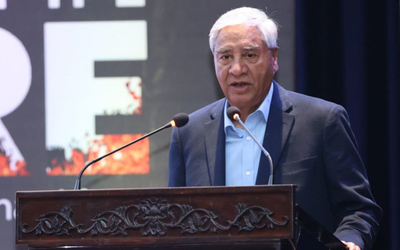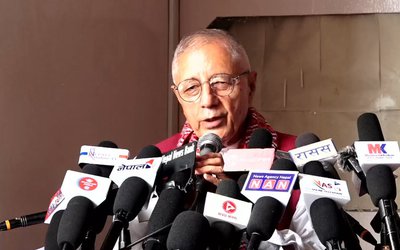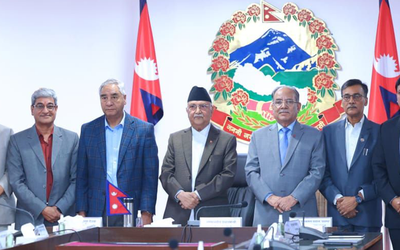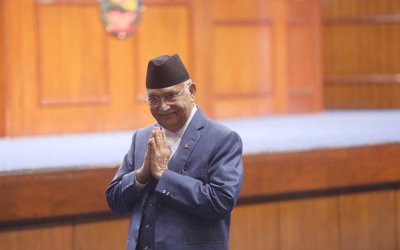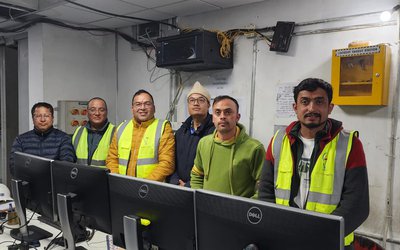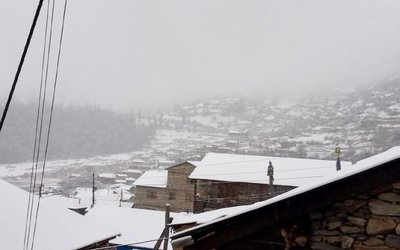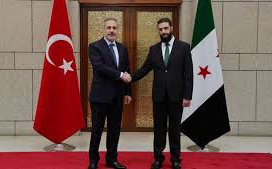After weeks of marathon negotiations on constitutional issue, political leaders turned down the table and agreed to form national consensus government under the leadership of Dr. Baburam Bhattarai. This abruptly shifts the state political process from constitution writing to formation of government.
“As per the seven point agreement, we will form a new national government till the completion of new constitution,” said NC leader Ram Chandra Poudel. “After the completion of constitution writing, there will be national government under the leadership of our party.”
As per the deal, Prime Minister Baburam Bhattarai will dissolve his cabinet tomorrow afternoon and formally request the political parties to form a national consensus government as agreed in the seven-point deal signed on November 1 last year.
The national consensus government, which is likely to comprise a 11-15 member cabinet, will be formed within the next two days.
The parties have also agreed that Prime Minister Bhattarai will resign once the parties reach an agreement on all the contentious issues of the constitution and a government led by the Nepali Congress will promulgate the constitution.
“A NC-led national unity government will be formed after agreement is reached on the new constitution and before it is promulgated,” said NC General Secretary Krishna Prasad Sitaula, who played a key role, along with Maoist Chairman Pushpa Kamal Dahal, in brokering the deal.
Given internal and external support Bhattarai enjoys, ultimately Nepali Congress and CPN-UML agreed to join the government and leaders of Madeheshi parties to resign.
Disputes On modality
As soon as political parties presented three different versions of state restructuring proposals, various forces including political parties, ethnic groups and regional groups announced agitation. Although State Restructuring Committee of CA proposed 14 provinces, the State Restructuring Commission has 12 and 6 district models, Nepali Congress proposes 7 provinces, CPN-UML 10 and UCPN- Maoist 12.
The demand for Mithila and Undivided far west raised the following in the presentation of various models of state restructuring by three major political parties. The entire process of constitution writing is now overshadowed by the issue of federalism and various groups have already made it clear that state restructuring is key to their struggle.
At a time when various ethnic groups are demanding provinces, a group led by Brahamin, Chettri, Dashnami, and Thakuri handed over the memorandum to prime minister and chairman of CA asking them not to divide the province on the basis of ethnicity and identity.
As political leaders failed to find the consensus on constitutional issues, many unorganized groups are spontaneously coming to lead the sentiments. Although it looks like the coming political scenario will be more chaotic and unpredictable, Nepal’s past experience is that Nepal’s political chaos cannot go for a long period of time. One of the well known political analysts termed it as controlled anarchy.
Possible scenario
CA members have already lost the hope that the constitution will be promulgated before May 27 in the present scenario. If things go as usual, political parties will extend the tenure of . The resignation agenda will push the constitutio writing process in the back seat. Politically prime minister Baburam Bhattarai has several options before him. According to the Interim Constitution, he and his coalition can continue even after May 27, even if final day for the CA elapses.
Similarly, given the growing political unrest in various parts of the country, he can also recommend for emergency. The violent indefinite general strike in Janakpurdham and tense situation in far west give ample reasons for this government to use emergency tool.
Technically, the prime minister is likely to resign after the Constitutional Committee of the CA prepares the final draft of the constitution and before the full CA endorses it.
Sitaula to lead NC in unity government
As Nepali Congress General Secretary Krishna Prasad Sitaula will likely to lead NC in the national unity government to be formed under the leadership of Prime Minister Baburam Bhattarai, former deputy prime minister Sujata Koirala has vehemently opposed the move. “ Enough is enough. We cannot tolerate anymore. I will oppose Sitaula who ruined Nepali Congress,” said Koirala.
As Nepal’s internal political forces are so weak and divided, they will invite the outside intervention. In this context, predict what you. One thing is almost certain that there will be controlled anarchy and dramatic political results.
Whoever may lead the government and whatever the forms of government and state system, given Nepal’s last six decades of experiences, it is certain that Nepal will have to pass through unstable political course for a long time to come.
- SWISS SUPPORT: Construction Of A Trekking Trail In Koshi
- Dec 19, 2024
- PM OLI'S VISIT TO CHINA: BRI Agreement
- Dec 16, 2024
- RASUWAGADHI AND SANJEN: Begin Generation
- Dec 03, 2024
- NEPAL, INDIA ELECTRICITY TRADE Nepal's Advantage
- Dec 02, 2024
- PM Oli'S VISIT TO CHINA: Nepal's Dilemma
- Dec 01, 2024



